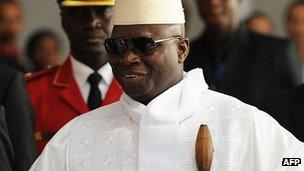Gambia's President Jammeh halts executions amid outcry
- Published

The Gambian president has suspended the execution of prisoners on death row, amid an international outcry.
In a statement, Yahya Jammeh said he was responding to "numerous appeals".
Nine prisoners have been executed since his vow in August to clear death row. Another 37 inmates remain on death row.
The executions were the first in The Gambia, a popular tourist destination, in 27 years, and human rights groups say it was mostly political prisoners who died.
Mr Jammeh's statement said the suspension of the executions followed numerous appeals at home and abroad, but warned that the halt could be temporary.
"What happens next will be dictated by either declining violent crime rate, in which case the moratorium will be indefinite, or an increase in violent crime rate, in which case the moratorium will be lifted automatically," the statement said, according to Reuters news agency.
The executions were opposed by the African Union as well as human rights groups.
Benin, which currently holds the chair of the African Union, sent its foreign minister to The Gambia to warn Mr Jammeh not to carry out any executions.
On Friday, a Gambian opposition political grouping told the BBC it was planning to create a government in exile in neighbouring Senegal within days.
Its leader, Sheikh Sidia Bayo said he was spurred to create the new group by the recent execution of some death-row prisoners.
The aim of the National Transitional Council of The Gambia (CNTG) was to see the end of President Yahya Jammeh's "dictatorship", he said.
The death penalty was abolished when former President Dawda Jawara led the country but was reinstated shortly after Mr Jammeh seized power in 1994.
- Published14 September 2012
- Published14 September 2012
- Published29 November 2011
- Published7 September 2010
- Published12 April 2023